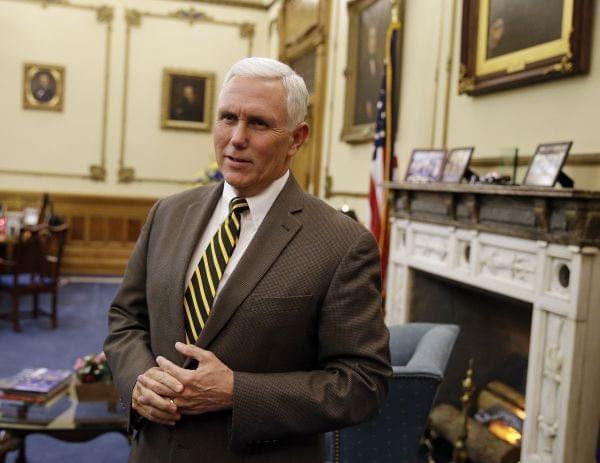Appeals Court Upholds Order Against Pence On Syrian Refugees

Indiana Gov. Mike Pence speaks after a meeting with Indianapolis Archbishop Joseph Tobin at the Statehouse Wednesday, Dec. 2, 2015, in Indianapolis, a day after the archdiocese said it has the means to resettle a Syrian refugee family bound for the state. Darron Cummings/Associated Press
A federal appeals court has upheld a lower court's order blocking Indiana Gov. Mike Pence from barring state agencies from helping Syrian refugees resettle in the state. A three-judge panel for the 7th U.S. Circuit Court of Appeals in Chicago on Monday agreed with an injunction a federal judge issued in February.
The judge found Pence's directive "clearly discriminates" against refugees from the war-torn nation. The appeals court says federal law doesn't allow a governor "to deport to other states immigrants he deems dangerous."
Donald Trump's running mate, Pence, was among dozens of governors from mostly Republican states who tried to block Syrian refugees after the Paris terror attacks last November.
The American Civil Liberties Union of Indiana won an injunction, arguing Pence doesn’t have the authority to do that. The state challenged the ruling but the three-judge appeals court upheld it.
At a hearing last month, the exchange between Judge Richard Posner and Indiana Solicitor General Thomas Fisher got heated.
POSER: Are Syrians the only Muslims that Indiana fears?
FISHER: This has nothing to do with religion. This has to do with …
POSER: Of course it does.
FISHER: Oh I object to that your honor.
Indianapolis-based Exodus Refugee Immigration, which helps Syrian refugees with medical and social services and job training, challenged Pence's order.
A spokeswoman for Pence says the governor sought the ban because of gaps in the screening of Syrian refugees.
Links
- Syrian Refugees; Voter Registration; Overtime Pay; Latinos in Baseball
- Indiana and Syrian Refugees
- Lawyers Questioned Over Indiana’s Syrian Refugees Order
- Duckworth Backs Protection For Civilians In Syria
- Rauner Condemns Trump Comments, Keeps Stance On Syrian Refugees
- Syrian Refugees Knocking on the Door
- Illinois Republicans In Congress Back Closing Borders To Syrian Refugees
- Governors: Illinois, Indiana Will Stop Accepting Syrian Refugees

